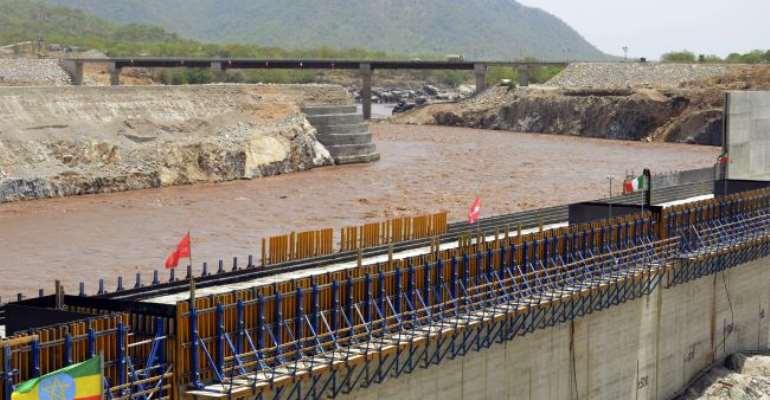Destabilizing Egypt; Ethiopia’s Nile River Dam

Ethiopia’s new “ Grand Renaissance Dam”, scheduled to be completed
next year, will take close to half (40%) of the Nile River’s water
every year for the next 5 years as it fills up. How is Egyptian
President Al Sisi going to survive for the next 5 years without almost
half the Nile’s water when the country is presently suffering serious
water and hydroelectric shortages, never mind crippling inflation,
growing hunger and a terrorist insurgency?
So far the world thinks that somehow, some way, Egypt, almost 100
million people and growing, already on shaky ground economically, will
find a way to survive something that the country has not faced in over
two thousand years, almost a half less water from the river Nile for 5
years straight. And what if a drought hits the Ethiopian highlands,
the source of the Nile River, with chances are this happening at least
once in the next 5 years with the accelerating global warming trend,
and Egypt loses over half of its water?
If international opinion turns out to be wrong, and that cutting
Egypt’s water by nearly half for 5 years is not survivable, then an
enormous explosion is brewing in Egypt, the Arab world’s biggest
country, this huge explosion being brought about by the construction
of Ethiopia’s massive dam generating 6,000 MW of electricity,
something that Ethiopia doesn't even have the infrastructure to use.
If Ethiopia can’t even distribute this new source of electricity for
its people to use due to an almost complete absence of any national
power grid, let alone local level infrastructure, than why has the
country gone so deeply into debt to build a dam that will do so much
damage to its northern neighbor, Egypt?
Those in the know are asking this question, for a potential
catastrophe could be in the making in Egypt with a hunger driven
popular explosion of rage against the rule of President Al Sisi and
fundamentally threaten the Egyptian military’s ability to hold the
country together. As in Syria and Iraq, ISIS is sure to take advantage
of the resulting chaos to spread its insurgency across the country and
all of this could lead to an Egyptian failed state situation.
Such a scenario has directed attention towards the likelihood of the
Egyptian military attacking Ethiopia’s new dam if the situation starts
to deteriorate domestically. Cutting the Niles water will be a
devastating blow to Egypts ability to feed itself and cutting off its
ability to produce food for export causing the loss of desperately
needed foreign currency.
Will the Egyptian people be able to endure such a dramatic increase in
their hunger and hardships for 5 years without an inevitable
explosion? Will Al Sisi be able to hold the Egyptian military together
and prevent the government from collapsing as a result of such a major
water shortage and inevitable mass hunger?
The origins of the very idea of Ethiopia daming the Nile are found at
the World Bank, majority owned by the USA. The World Bank, whose
policy for many disastrous decades was to push dam construction in
some of the most vulnerable areas of the planet was the first to raise
the “grand dam” idea, to harness the waters of biblical proportions
for a “Greater Ethiopia”.
The problem, again, is that 70% of Ethiopians don’t have access to
government electricity, almost 70 million people. The Ethiopian
government has gone so deeply into debt building this new 6,000 MW dam
there is nothing left over to build the electrical distribution
network the country so desperately needs. So all that new electric
power will not go towards uplifting the lives of Ethiopians, “for a
Greater Ethiopia”, but be sold on the East African market to pay the
onerous debt incurred in building the damn thing.
The needs of Ethiopia for many years in the future could have been met
by building a series of smaller, much less expensive dams that would
not cause such a drastic interference in the Nile River’s flow.
Yet thanks to the World Banks persistence, Ethiopia went ahead with
its “grand dam” and the result could be an explosion of popular anger
in Egypt that could threaten much of the worlds economy, being that
Egypt controls the Suez Canal, through which the largest trading
partners in the world, Asia and Europe, do 90% of their business. It
is Egyptian troops, whose salaries are paid for by the USA, that
control the Suez Canal and if the Egyptian military loses control of
the country in a popular uprising similar to which brought down
Mubarak, than the continued reliability of the army to control the
Suez Canal comes into question. Of course, there is always the Israeli
Army waiting in the wings, ever ready to step in and occupy the first
Great Canal in Suez.
Could it be that having Egypt and Ethiopia, two out of three of
Africa’s largest countries, at each others throats is in the national
interests of the USA, that wants at all costs to prevent African
unity, neither economic or political?
Again we find the USA’s policy of “crisis management” behind the
scenes in this brewing conflict, as in create a crisis and then manage
it to divide and conquer, the better to loot and plunder African
resources with as little resistance as possible.
Thomas C. Mountain is an independent journalist , living and reporting
from here since 2006. See thomascmountain on Facebook or best reach
him at thomascmountain at g mail dot com
